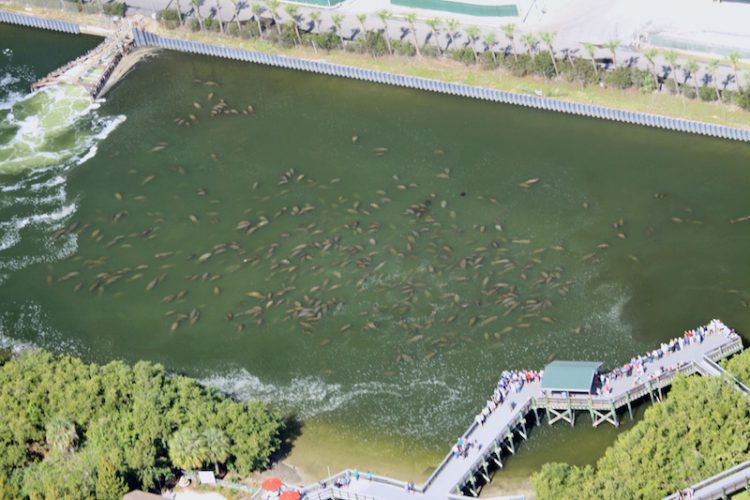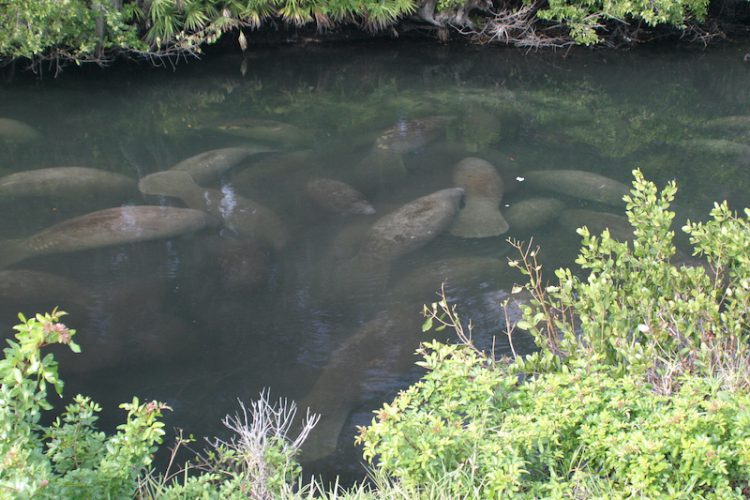Full Title: Creating Secure Warm-Water Habitat Networks for Manatees along Florida’s Gulf Coast: Developing a Vision, Identifying Gaps, and Prioritizing Restoration Sites
This project prioritized efforts to restore, enhance, and create warm-water habitats in order to provide a network of thermal shelters for manatees along Florida’s Gulf Coast.
Lead Investigator: Charles Deutsch, Florida Fish & Wildlife Conservation Commission, chip.deutsch@myfwc.com
Natural Resource Manager: Maria Merrill, Florida Fish & Wildlife Conservation Commission
Project Team: Margie Barlas, Chelsey Crandall, Holly Edwards, Timothy Gowan, Andrea Krzystan, and Leslie Ward-Geiger (Florida Fish & Wildlife Conservation Commission, Fish & Wildlife Research Institute); Ron Mezich and Michelle Pasawicz (Florida Fish & Wildlife Conservation Commission); Terri Calleson (U.S. Fish & Wildlife Service); and Julien Martin (U.S. Geological Survey)
Federal Program Officer/Point of Contact: Frank Parker (frank.parker@noaa.gov)
Award Amount: $124,996
Award Period: September 2021 – August 2024
Why it matters: In order to regulate their body temperature, manatees must find pockets of warm water during the cold, winter months. However, along Florida’s Gulf Coast, less warm-water habitat is available due to declines in spring flow and the elimination of power plant thermal discharges. Managers are working to ensure that reliable networks of thermal refuges are present for manatees over the long term. A joint state-federal action plan outlines broad management actions that could address this problem, but a range of uncertainties, such as the location of these habitats, need to be addressed to better inform decision-making.
What the team did: The overarching goal of this project was to identify and prioritize research efforts that are needed to inform key management decisions to secure warm-water habitat networks for manatees. The team conducted a scoping workshop with individuals from state and federal agencies, non-governmental organizations, utility companies, and boating groups to gain their perspectives, objectives, local knowledge, and input on future management decisions. After the workshop, participants were invited to take a survey to provide additional feedback. The team also conducted interviews with manatee experts to gather input on management decisions, information gaps, and research priorities. Finally, the team compiled an inventory of datasets relevant to manatees and warm-water habitats in the Gulf.
Summary of outcome: Based on input from the workshop and interviews, the team developed a list of 13 management decisions that are set to be made in the next 20 years. They also identified and prioritized 18 knowledge gaps that currently hamper the ability to make decisions. The top knowledge gaps identified were related to where warm-water habitats exist and how those areas are predicted to change. The team developed six research studies that would be able to fill the existing knowledge gaps.
Not applicable
Not applicable
Nov. 1, 2021 – Florida’s Plan to Protect Manatees and Support Habitats, Florida Political Review
Oct. 4, 2021 – Save the manatees: Researchers seeking new ways to restore, enhane warm water habitats in Florida, Naples Daily News
Not applicable
 Official websites use.gov
A .gov website belongs to an official government organization in the United States.
Official websites use.gov
A .gov website belongs to an official government organization in the United States.
 Secure .gov websites use HTTPS
A lock or https:// means you’ve safely connected to the .gov website. Share sensitive information only on official, secure websites.
Secure .gov websites use HTTPS
A lock or https:// means you’ve safely connected to the .gov website. Share sensitive information only on official, secure websites.

